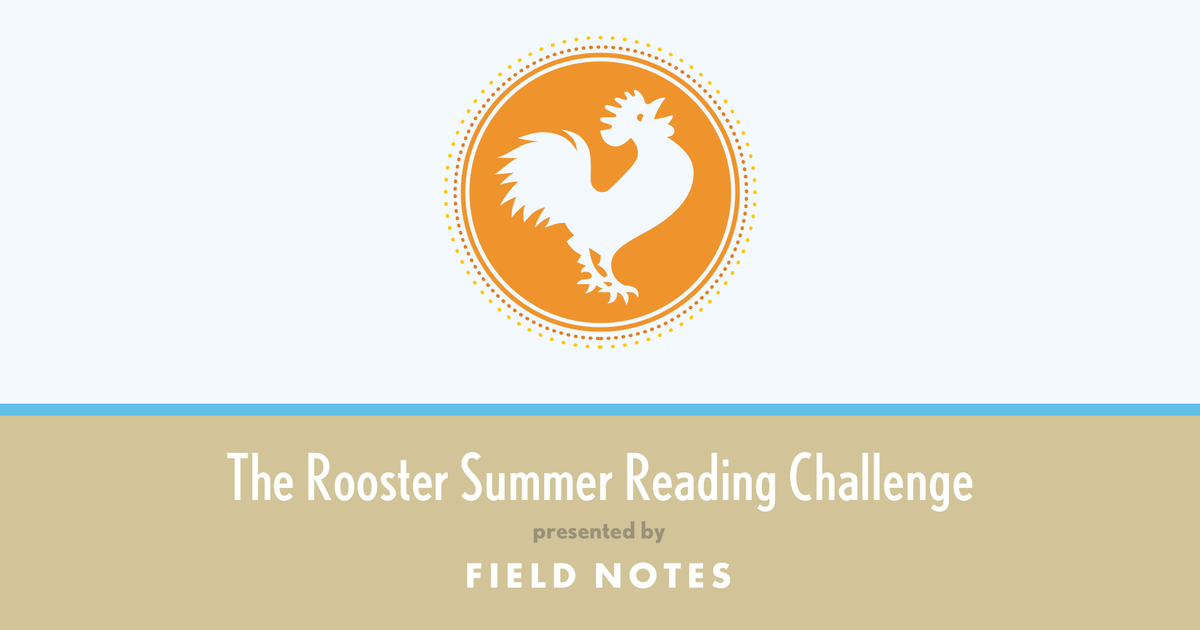The Rooster Summer Reading Challenge: Week 12
This week, we finish up our sixth and final book of the summer, Fever Dream, and it's your turn to tell us which of our summer reads wins a slot in the 2018 Tournament of Books.

Welcome to the Rooster Summer Reading Challenge, brought to you by The Morning News Tournament of Books and our presenting sponsor, Field Notes. All summer long, we’re reading two novels a month and reconvening on Wednesdays to discuss the books. Joining our chats is a monthly guest judge, who at month’s end decides which title heads to our summer championship on Aug. 30—when you choose which book gets an automatic berth in the 2018 Tournament of Books.
For August we’re reading Temporary People by Deepak Unnikrishnan (selected by the ToB Committee) and Fever Dream by Samanta Schweblin (chosen by Victor LaValle, who joined us in June), with novelist Rachel Khong.
- Catch up on previous chats: A Separation (first half, second half), The Night Ocean (first half, second half), Ill Will (first half, second half), Marlena (first half, second half), Temporary People (first half, second half), Fever Dream (first half)
- Jump into this week’s discussion in the comments
Nozlee Samadzadeh: We’ve reached the end of Fever Dream and, nearly, the end of the Rooster Summer Reading Challenge. Before our August judge, Rachel Khong, decides which of this month’s two books—Fever Dream or Temporary People—moves ahead, we’d like to extend a huge thanks to her for joining us these past few weeks. Once Rachel sends August’s winner into the ring, it’s up to you, our readers, to vote below on which of our three summer finalists is going to the 2018 Tournament of Books.
Rachel Khong grew up in Southern California, and holds degrees from Yale University and the University of Florida. From 2011 to 2016, she was the managing editor then executive editor of Lucky Peach magazine. Her fiction and nonfiction have appeared in Tin House, Joyland, American Short Fiction, the San Francisco Chronicle, The Believer, and California Sunday. She lives in San Francisco. Goodbye, Vitamin is her first novel.
Nozlee Samadzadeh is the ToB producer and a developer at Vox Media.
But first, let’s discuss the conclusion of Fever Dream. In the second half of the book, Amanda and her daughter Nina stop to visit David’s mother Carla while leaving the small town where they’ve been vacationing. While waiting for her at the soy farm where she works, they are somehow poisoned from contact with water, just as David was. After Carla takes them to the clinic, we’re then trapped in Amanda’s increasingly delirious understanding of the world. We learn David’s part of the narration may be a hallucination on Amanda’s part; we come to an understanding that the poisoned children—such as David—the dying animals on David’s family’s farm, and the vast fertilized soy fields are all related. Finally, Nina disappears from the storyline as “rescue distance” (Amanda’s name for the obsession with constantly being near enough to her daughter to save her) fails and the worst thing happens: Carla takes Nina to the spirit healer to save her body but lose her soul, and nothing can be done about it.
How’d the novel end for you, Rachel? Did the fever break?
Rachel Khong: The book remained fevered and strange until the end, but stayed compelling—which surprised me, I think. I could see being frustrated with the book if it were any longer than it is, but I found it thrilling to be swept up in this dream for this limited moment. After I finished it, I had that feeling of leaving a movie theater: taking uneasy steps, adjusting my eyes to too-bright light, wondering, “How do I interact with people now?”
What about you, Nozlee?
Nozlee: As I reached the end, I found myself reading faster and faster as I hoped for some kind of resolution to the first half’s increasing intensity. As you say, it stays strange until the end, but after finishing I reread the second half immediately—I could finally breathe easily and take in the details instead of rushing to find out what happens.
There was some discussion in the comments last week about how it can be hard to read a book in which children are in danger. Do you think any of the tension in Fever Dream was gratuitous, or was there anything that didn’t work for you? I’m not sure I was totally convinced by the suggestion that David’s half of the dialogue might be imagined by Amanda, which isn’t really explored further, or by the very last scene between David’s dad and Amanda’s husband, trying to make sense of their missing wives and poisoned children, which is a flash of the future that David, using his mysterious power to “push” the dying over the edge, gives Amanda as she is fading away.
Rachel: Agree with being wholly uninterested in what the dads had to say. Things were so not about them! But I didn’t feel the tension was gratuitous at all. Though I can see where people are coming from, I thought it was just enough tension, just enough fear. Children are constantly in danger. I’m not a mother, but I imagine parenting would be terrifying, that I'd be unremittingly worried about my child's safety. My own mother still thinks I never walk alone outside, and especially not at night. I wonder if it ever ends. That pure terror was captured and conveyed well.
Nozlee: I was going to make a joke about how no one should tell my mom that I don’t always walk outside at night accompanied, either, but you’re right: The book’s urgency makes the rescue distance hard to make fun of.

Field Notes Limited-Edition for Summer is Campfire. Campfire features three original photos that have been line-screened and carefully spot-printed, for a vintage feel, and each pack comes with a custom “Campfire Master” patch, ready for your scout sash or messenger bag.
Rachel: That said, another thing that’s been nagging at me a little bit is that though the book is about children in danger, at times it didn’t feel like they were actual children in actual danger. The book was magical from the beginning and so I felt less nervous about these children in danger—they didn’t feel wholly real. And yet, I do think that they’re meant to feel real, and that we’re meant to feel real fear of the mother losing her child, of her child being put in danger. That’s why all the repeated talk of “rescue distance.” But I’m not sure if that emotion comes through as much as it’s meant to. I wonder if the impenetrability obscures some of that real feeling.
What did you think? Did you feel that one of the book’s preoccupations was the love of a mother for her child, and if so, do you think that was done successfully?
Nozlee: I actually don’t think it was a book about mothers and children, which is maybe weird to say because they’re featured so prominently! Last week in the comments Bob Lopez described Fever Dream as “environmental horror,” which I loved. (By the way, if anyone can think of other novels in that genre, I’d love to hear about them.) The parent-child relationships in the book definitely existed to service the magical danger of the environment, instead of the other way around. I think that’s why Nina and David didn’t feel “wholly real.”
Rachel: After I finished the book I did some research into just what was going on: Apparently the poison is a pesticide called glyphosate that’s commonly used in soy and cotton fields in Argentina, and about 12 million Argentines live in places where soy is cultivated. The worry is that it’s causing birth defects, miscarriages, cancers. This book certainly depicted the havoc it wreaks. Yet FernGully, this was not. I wouldn’t have known about glyphosate had I not gone looking for more clarity. Did Fever Dream feel, to you, like a well-executed environmental warning book? Do you think that was even the intent?
Nozlee: I’m impressed (and grateful) that you looked it up—I had assumed the poison was a standin for pollution in general! I do think environmental awareness is one of the intents of Fever Dream, but if it didn’t actually spur me into learning more about the world around me, maybe that means it was a less effective book than I thought it was.
Any last words on Fever Dream? How would you describe this book if you were recommending it to someone?
Rachel: I found myself attempting to describe it over dinner earlier this week, and I think I lamely described it as “short, creepy, weird”—all accurate descriptors, but woefully insufficient.
Nozlee: So now it’s time to decide: Will it be Fever Dream that moves on, or Temporary People? And why?
Rachel: Both books impressed me with their originality. Both were fascinating to read—though the actual process of reading was not always wholly comfortable. Both books were hugely ambitious—tackling enormous themes with very different approaches. And they were stunningly and expertly written; both authors can write the hell out of a sentence, conjure a gorgeous image.
Ultimately, I thought Fever Dream was more successful in its exploration of its obsessions: motherhood, the people who are supposed to take care of you, how helpless you nevertheless are when it comes to, well, everything. Temporary People was more forthcoming in its ambition, but page by page, Fever Dream accrues, quietly, and becomes something powerful.
This month’s winner: Fever Dream
Nozlee: Thanks again to Rachel for joining us—and to Victor LaValle and Amelia Grey, our June and July visiting novelists. And now over to Andrew to explain how the voting process will work.
Andrew: Now that we have our August winner in the books, it’s up to you, our readers, to decide which of our summer finalists receives an automatic entry into the 2018 Tournament of Books. Use the form below to choose which novel you think should get a shot at the Rooster. Voting ends next Tuesday, Aug. 29, at midnight ET, and we’ll see you again next week—when we announce our summer champion.
